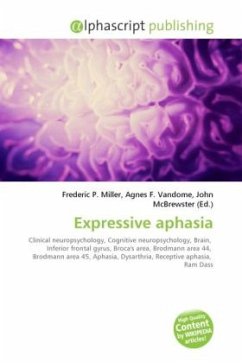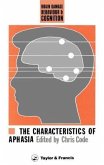Expressive aphasia, known as Broca's aphasia in clinical neuropsychology and agrammatic aphasia in cognitive neuropsychology, is caused by damage to or developmental issues in anterior regions of the brain, including (but not limited to) the left posterior inferior frontal gyrus known as Broca's area (Brodmann area 44 and Brodmann area 45). Expressive aphasia is one subset of a larger family of disorders known collectively as aphasia. It is characterized by the loss of the ability to produce language (spoken or written). Expressive aphasia differs from dysarthria, which is characterized by a patient's inability to properly move the muscles of the tongue and mouth to produce speech. Expressive aphasia contrasts with receptive aphasia, which is characterized by a patient's inability to comprehend language or speak with appropriately meaningful words.
Bitte wählen Sie Ihr Anliegen aus.
Rechnungen
Retourenschein anfordern
Bestellstatus
Storno








